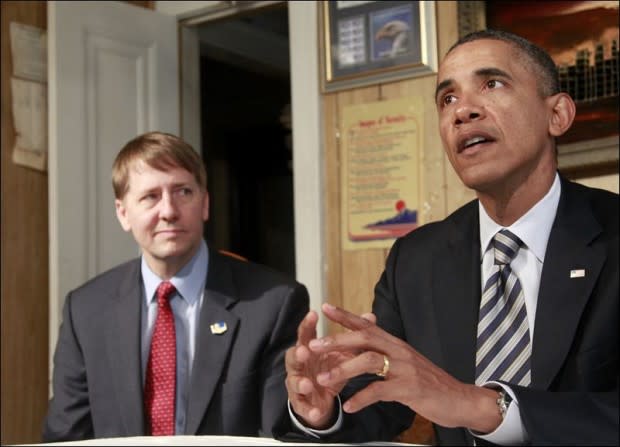Obama Uses Executive Authority to Make Recess Appointment — While Senate Is Still in Session
Scroll down for an update to this story:
In a defiant display of executive power, President Barack Obama on Wednesday will “stick his thumb in the eye” of GOP opposition and name Richard Cordray as the nation’s chief consumer watchdog. Outraged Republican leaders in Congress suggested that courts would determine the appointment was illegal.
But why are Republican leaders outraged at this recess appointment? Well, mostly because the Senate is still in session.
Although President Obama has constitutional power to make appointments during a congressional recess, Republicans have moved to keep that from happening by having the Senate running in “pro forma” sessions, meaning open for business in name with no actual business planned.
The Senate held such a session on Tuesday and planned another one on Friday. Republicans contend Obama cannot make a recess appointment during a break of less than three days, based on years of precedent.
The Obama White House contends such an approach is a gimmick. For all practical purposes, the Senate is in recess and Obama is free to make the appointment on his own.
McConnell said that Obama’s move “lands this appointee in uncertain legal territory, threatens the confirmation process and fundamentally endangers the Congress’ role in providing a check on the excesses of the executive branch.
The president plans to argue that the appointment was necessary because, with a new director in place, the new Consumer Financial Protection Bureau can start overseeing the mortgage companies, payday lenders, debt collectors and other financial companies.

It seems certain to raise the level of confrontational politics for a president seeking re-election by championing the middle class. Acting right after Tuesday’s GOP presidential caucuses in Iowa, Obama is seeking to grab attention with his most brazen leap-frog over Congress and show that criticism won’t slow him.
Republicans have stalled Cordray’s nomination because they think the consumer agency is too powerful and unaccountable.
The Senate’s top Republican, Sen. Mitch McConnell of Kentucky, accused Obama of an unprecedented power grab that “arrogantly circumvented the American people.”
Added House Speaker John Boehner, R-Ohio: “It’s clear the president would rather trample our system of separation of powers than work with Republicans to move the country forward. This action goes beyond the president’s authority, and I expect the courts will find the appointment to be illegitimate.”
By his move, Obama essentially is declaring the Senate’s short off-and-on legislative sessions a sham intended to block his appointments.

Chief consumer watchdog Richard Cordray (left) and President Barack Obama (right)
Furthermore, it was the president’s own party that set this precedent. Democrats started the practice when George W. Bush was president to halt him from making recess appointments.
The White House braced for fallout, but said Obama was left with little choice to get the consumer agency fully running after months of stalemate.
White House communications director Dan Pfeiffer announced Obama’s move on Twitter after senior administration officials first confirmed it to The Associated Press.
Obama planned to talk about his decision at an economic event in Cordray’s home state of Ohio, accompanied by Cordray.
Cordray would take over the job later in the week and stands to serve for at least the next two years, covering the length of the Senate’s session.
Obama planned to say that every day Cordray waited for confirmation, millions of people remained unprotected from dishonest financial practices, according to prepared remarks obtained by the AP.
“That’s inexcusable,” Obama says in the remarks. “And I refuse to take `No’ for an answer. I’ve said before that I will continue to look for every opportunity to work with Congress to move this country forward. But when Congress refuses to act in a way that hurts our economy and puts people at risk, I have an obligation as president to do what I can without them.”

More than a standoff over one significant appointment, the fight speaks to the heart of a presidential campaign under way. Presiding over a troubled economy, Obama’s is trying to persuade a weary middle class that he is their advocate, while fending off criticism from Republicans challengers and lawmakers.
Republicans have had little opposition if any to the qualifications of Cordray, a former Ohio attorney general. Their objection is with the consumer agency itself.
Obama and his team say lawmakers should try to revise the Wall Street oversight law if they don’t like it, not keep the agency from performing its job.
What should one expect to see happen next? Ed Morrissey of Hotair offers some insight:
Don’t be surprised if Obama turns to the [National Labor Relations Board] NLRB next. The board can’t operate without a quorum, which it now lacks, and the GOP won’t budge after the activism of the NLRB under the influence of his previous recess appointment, Craig Becker. Cordray won’t cost him much political damage, but Obama will come under fire regardless of which way he goes on this. Business leaders will erupt in outrage if he forces more activists onto the NLRB, and unions will be just as outraged if he doesn’t. Obama needs the former for funding and the latter for organization in the coming election, but setting this precedent will make it almost impossible for Obama to resist more recess appointments.
Update: It looks as if Morrissey’s prediction was spot-on accurate. A recent report claims that the president has lost no time in appointing new members to the NLRB.
“…President Barack Obama said in a statement Wednesday he will recess-appoint three people to the National Labor Relations Board,” writes Steve Goldstein of Marketwatch.
“The three, Sharon Block, Terence Flynn and Richard Griffin, would allow the controversial board to continue to operate, since at the moment it only has two members and quorum rules require that at least three be present,” Goldstein adds. ” Senate Republicans had sought to block the appointments.”
The Associated Press contributed to this report.

